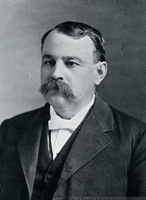
Justice Marmaduke Herbert Dent (April 18, 1849-September 11, 1909) was born in Granville, Monongalia County, and his childhood was framed by the tumultuous years of conflict over slavery, secession, and the Civil War. His father, Marshall Mortimer Dent, edited the Morgantown Virginia Weekly Star, 1856–62, a newspaper that favored compromise to save the Union. As a delegate to the Virginia secession convention, the elder Dent voted against secession.
In 1867, Dent enrolled in the first class at West Virginia University and later received the first B.A. (1870) and first M.A. (1873) degrees granted by the university. Afterward, he became a teacher and moved to Taylor County, where he served as deputy clerk and notary public. He also read the law, was admitted to the bar in 1875, and opened an office in Grafton.
Dent served on the city council, as town clerk, and on the school board. In 1892, Dent won election to the West Virginia Supreme Court of Appeals on the Democratic-People’s Party (Populist) fusion ticket and served from 1893 to 1905.
Justice Dent declared war on the railroads by trying to restrain their open abuse of the special privileges granted to them by state charters. Dent generally constituted a minority of one on the court, with Justice Henry Brannon a particular adversary.
While a stern moralist who sought biblical foundations for the law, Dent was a populist in his politics and jurisprudence. He adhered to the theory that a judge must take ‘‘justice’’ into consideration when deciding a case, for example, by balancing the weakness of the poor victim against the power of the wealthy corporation. He reasoned that the state had created the corporations for public purposes and, therefore, should limit corporate powers when their actions were harmful to the public. Hence, Dent was much more likely to hold the railroads to a higher standard of behavior, and award damages to plaintiffs, than the pro-industry majority on the court.
Although often on the losing side of Supreme Court decisions, Dent was in the majority on the pioneering 1898 civil rights case, Carrie Williams v. Board of Education. He authored the court’s opinion in the case, ruling that black students were entitled to the same length of school term as white students and that teacher Williams was entitled to the same pay. Long foreshadowing the modern practice of affirmative action, Dent wrote for the Court that, “If any discrimination as to education should be made, it should be favorable to, and not against, the colored people.”
Marmaduke Dent failed in his bid for reelection to the court in 1904 and retired to his home in Grafton.
This Article was written by Ronald L. Lewis
Last Revised on January 12, 2023
Sources
Reid, John Phillip. An American Judge: Marmaduke Dent of West Virginia. New York: New York University Press, 1968.
Cite This Article
Lewis, Ronald L. "Marmaduke Dent." e-WV: The West Virginia Encyclopedia. 12 January 2023. Web. 26 July 2024.




Comments?
There aren't any comments for this article yet.
Click here to read and contribute to the discussion →